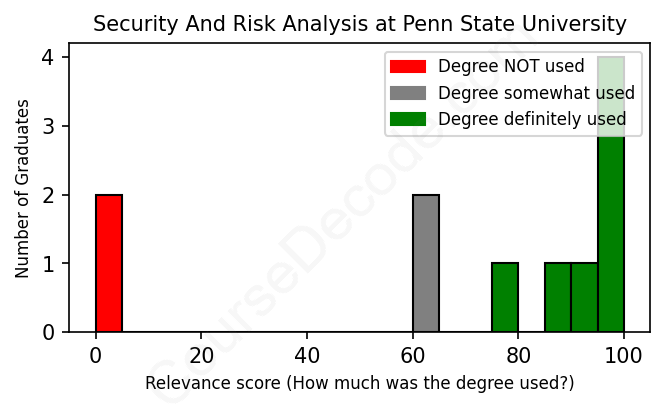
First, some facts. Of the Security And Risk Analysis graduates from Penn State University we've analyzed , here's how many have used (or NOT used) their degree in their career:

These are estimates based on AI analysis of 11 LinkedIn profiles (see below).
The verdict? Slightly above average. Overall, with an average relevance score of 70%, Security And Risk Analysis graduates from Penn State University have a slightly higher likelihood (+3%) of finding work in this field compared to the average graduate across all fields:
And for comparison, here's the chart for all profiles we've looked at across all degrees.
Also, after graduating, only 0% of these graduates have pursued further education other than another Bachelor's degree (such as a Masters degree or other), compared to the average across all profiles of 35%. This suggests a Bachelors degree is enough for most Security And Risk Analysis graduates, and it's normal to look for work straight after graduation.
See the details:
|
Relevance score: 100% We think this person has gone into a career highly relevant to their degree. We think this person has gone into a career highly relevant to their degree.
DEGREE INFOGraduated in 2021 from Penn State University with a Bachelor of Science - BS in Security And Risk Analysis. No other secondary education since. JOB HISTORY SINCE GRADUATIONCybersecurity Consultant FTI Consulting Jan 2022 - Present ABOUTNo information provided. |
The top 10 most common jobs done by the graduates we've analyzed (ranked most common to least) are:
When taking a look at the types of jobs that folks from Penn State with a degree in Security and Risk Analysis have landed, it seems there's a real mix. Many graduates have gone into roles that seem pretty aligned with what they studied, like Security Analysts, Risk Analysts, and positions at places like the Department of Defense. These roles, as you might guess, require the kind of skills and knowledge that come straight from their degree, focusing heavily on security protocols, risk management, and compliance. So, it's great to see that some graduates are putting their education to good use in areas where they can really make a difference.
However, there’s also a notable number of graduates who ended up in jobs that don’t really tap into their Security and Risk Analysis education. Positions like substitute teachers, general managers, and contract specialists float around, showing that not every grad sticks to a path that relates directly to their major. While some roles may offer transferable skills, they mostly deviate from the core focus of security and risk. So, in the end, while plenty of alumni are thriving in relevant fields, a good chunk seems to be taking less typical routes, which might not fully utilize their potential in security and risk analysis.
Here is a visual representation of the most common words in job titles for Security And Risk Analysis graduates (this is across all Security And Risk Analysis graduates we've analyzed, not just those who went to Penn State University):

Based on the profiles of graduates from Penn State University who studied Security and Risk Analysis, it looks like they've had pretty solid career paths, especially as they move further along in their careers. For many of these graduates, their first jobs after finishing school tend to be in entry-level tech or security roles, like security analysts or software engineers, which makes sense given their degree focus. For example, folks who graduated in 2016 and afterward landed positions in companies that emphasize security, like the Hershey Company and NBCUniversal, which is a great sign that they're capitalizing on their specialized knowledge right out of the gate.
As time goes on, many of these graduates seem to be moving up the ladder into more senior positions, often within the tech industry or in roles focused on security and risk management. For instance, graduates from 2016 are now in senior roles at companies like MITRE and the Hershey Company, demonstrating a good upward trajectory. Even those who started out as interns or in less direct roles seem to navigate their careers towards things that relate to information security and risk management over time. However, there are some outliers like those who ended up in seemingly unrelated jobs, like teaching, which can happen. Overall, it looks like a lot of graduates are finding productive and relevant careers in their field, particularly as they gain experience and specialize further.
Honestly, a Bachelor’s degree in Security and Risk Analysis at Penn State can be a bit challenging but totally doable, especially if you’re into problem-solving and critical thinking. The coursework usually includes some technical stuff like data analysis, as well as understanding various security frameworks and risk management practices. It's not the easiest path out there—there's definitely a load of information to grasp, and you might find yourself diving into some complex projects. However, if you’re passionate about the subject, it can be a rewarding experience, and with the right mindset and study habits, you’ll be fine. Just be prepared to put in some effort and stay organized!
Most commonly, in the LinkedIn profiles we've looked at, it takes people 4 years to finish a Bachelor degree in Security And Risk Analysis.
Looking at these graduates from Penn State, it seems like the ones who were able to land solid roles in the tech and cybersecurity fields are likely doing pretty well financially. For instance, graduates who moved into positions like Software Engineer, Security Analyst, and Infrastructure Engineer typically earn good salaries due to high demand in those areas. On the flip side, there are those who started in roles like substitute teaching, which usually pays quite a bit less, especially in the early stages of their careers. Overall, it looks like the folks who got into tech and security early on (especially ones with senior roles) are probably making decent money, while the more traditional roles may not be as lucrative.
Here is a visual representation of the most common words seen in the "about" section of LinkedIn profiles who have a Bachelor degree in Security And Risk Analysis (this is across all Security And Risk Analysis graduates we've analyzed, not just those who went to Penn State University). This may or may not be useful:

Here are all colleges offering a Bachelor degree in Security And Risk Analysis (ordered by the average relevance score of their Security And Risk Analysis graduates, best to worst) where we have analyzed at least 10 of their graduates:
| College | Score | Count |
|---|---|---|
 Penn State University Penn State University
|
70 | 11 |